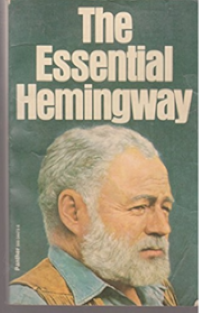
Jonathan Cape was the U.K. publisher of all of Hemingway’s major works, starting with In Our Time in 1926 through Islands in the Stream in 1970. Hemingway’s royalty arrangements with Cape for any U.K. editions were made separately from any contracts he had with Scribner’s; Cape simply licensed the works from Scribner’s.
Regarding the publication of The Essential Hemingway, it’s clear that Cape and his partner Wren Howard were aware that they were importing the selection of Hemingway’s work that Malcolm Cowley had made for the Portable Hemingway, while removing all of Cowley’s editorial material. In a history of the company published in 1971, Howard’s son Michael reported on the trip Cape made to the U.S. to secure contracts for several titles:
"Early in [March] 1947 Jonathan paid his first visit to New York for seven years . . . after a few weeks in New York [Cape and his wife] went down to Cuba to see Ernest Hemingway. There he was able to make contracts for the next novel [probably Across the River and into the Trees] and for The Essential Hemingway, a selection of his work which Malcolm Cowley made."1
It may have been that Cape, having seen the success of Viking’s Portable Hemingway, wanted to issue an identical volume, but did not want, or did not want to pay for, Cowley’s prefatory material, so they simply removed it and kept the content in its identical arrangement—an arrangement, by the way, that had been carefully assembled by Cowley to support the thesis in his critical introductions. Or perhaps Cowley was not well enough known to an English audience, rendering his editorial contributions commercially irrelevant.
The Essential Hemingway was well received by at least one U.K. reviewer, who wrote, tellingly, in the Daily Express, “It is not stated who extracted this essence. It is a neat job . . . For the novice, there could be no better initiation into the work of one of the most potent living writers in English. For students of Hemingway, here is a well-balanced second view.”2
The Essential was the first title in what became a series for Cape, seemingly based along lines similar to the Viking Portables: a selection of a particular author’s work, often introduced by an authority known to an English audience. Cape published at least nine other titles in the “Essential” series between 1948 and 1952, treating U.K. authors such as T.E. Lawrence, Samuel Butler, W.H Davies, R.B. Cunningham-Graham, Mary Webb, James Joyce (this was identical to The Portable James Joyce, edited by Harry Levin in 1947), and, amazingly, Uncle Remus.3
How essential was The Essential Hemingway? The answer to that may depend on your point of view. It certainly seems to have been a robust title for Cape, as the first book in an ongoing series, and one that kept selling through various book club editions and paperback versions. But it was not influential in the way that the Portable was. I came to see that, with the Portable Hemingway out of print in the U.S. by 1950, The Essential Hemingway functioned as a kind of bridge between the Portable (1944) and Scribner’s later Hemingway Reader (1953), edited by Charles Poore. I hope to tell the longer story of these latter two anthologies in a future piece for The Hemingway Review.
Works Cited
Cowley, Malcolm. “A Letter From Malcolm Cowley.” Fitzgerald/Hemingway Annual 1971. Edited by Matthew J. Bruccoli. Microcard Editions, 1971, pp. 317-18. Letter dated 13 Oct. 1970.
Grissom, C. Edgar. Ernest Hemingway: A Descriptive Bibliography. Oak Knoll Press, 2011.
Hanneman, Audre. Ernest Hemingway: A Comprehensive Bibliography. Princeton U P, 1967.
Hemingway, Ernest. Ernest Hemingway: Selected Letters 1917–1961. Edited by Carlos Baker. Scribner’s, 1981.
Howard, Michael S. Jonathan Cape, Publisher: Herbert Jonathan Cape, G. Wren Howard. Cape, 1971.
Scribner, Charles Jr. In the Company of Writers: A Life in Publishing. Scribner’s, 1990.
Notes
1 Michael S. Howard, Jonathan Cape, Publisher: Herbert Jonathan Cape, G. Wren Howard (Cape, 1971), pp. 209-10. The circumstances and later professional relationship between Hemingway and Cape from ca. 1926 to 1944 are related by Howard (78-80) in admiring terms. In spite of the rosy picture Howard paints, however, Hemingway was not a big fan of Jonathan Cape. In a long letter to his editor Maxell Perkins (3/5/47) Hemingway complained about the inconveniences imposed by Cape’s visit that March and spelled out his opinion of Cape and his irritation with the interruption of his work (Selected Letters 615-18). Six years later, an exchange of letters in April and May between Hemingway and Charles Scribner, Jr., dealt with Cape’s snatching away from Scribner’s the Canadian rights to Alan Paton’s novel Too Late the Phalarope. Scribner also alludes to this episode in In the Company of Writers (97).
2. Excerpted from the quote on the back panel of the jacket to The Essential James Joyce (Cape, 1948).
3 While Cape was not averse to what might be called aggressive borrowing from other publishers when it suited him, it is not clear how The Essential Hemingway actually came about. The file labeled “1947: Cape, Jonathan Ltd” (Series 9, Box 754, Folder 2) in the Scribner archives at Princeton includes only ten pages of documents, none of them relating to the Essential. My thanks to Adrienne Rusinko at the Firestone Library for providing a digital reproduction of the file’s contents. The website of the Jonathan Cape Archive at the University of Reading simply says, “Please note that the pre-1960 archive is sparse” (https://collections.reading.ac.uk/special-collections/collections/jonathan-cape/).
Peter Coveney was formerly Executive Editor for History at Wiley, managing the overall History team and acquiring text and reference titles in European, British, and World History. He has also held positions at Oxford University Press, Harper & Row, and CBS College Publishing. He is a contributing editor for Firsts Magazine, where he has published more than two dozen articles on various aspects of book culture, publishing history, and book collecting. He presented at the Hemingway Society Conference in Paris in 2018.